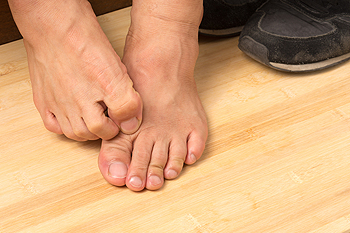 Athlete’s foot is a contagious condition, and as its name suggests, is often common among those who participate in sporting activities. Athlete’s foot can be identified by a few different symptoms. These indicators may include cracking or peeling blisters between the toes, redness and scaling on the soles of the feet, rashes and bumps on the feet, and itchiness. Even though the name is athlete’s foot, this condition can develop for anyone. Not wearing the proper footwear in warm and moist environments can lead to developing athlete's foot, as that is where fungi tend to thrive. These environments can include public swimming pools, communal showers, gyms, and locker room floors. If you believe you have developed athlete’s foot, it is suggested that you seek the help of a podiatrist for proper and professional care.
Athlete’s foot is a contagious condition, and as its name suggests, is often common among those who participate in sporting activities. Athlete’s foot can be identified by a few different symptoms. These indicators may include cracking or peeling blisters between the toes, redness and scaling on the soles of the feet, rashes and bumps on the feet, and itchiness. Even though the name is athlete’s foot, this condition can develop for anyone. Not wearing the proper footwear in warm and moist environments can lead to developing athlete's foot, as that is where fungi tend to thrive. These environments can include public swimming pools, communal showers, gyms, and locker room floors. If you believe you have developed athlete’s foot, it is suggested that you seek the help of a podiatrist for proper and professional care.
Athlete’s Foot
Athlete’s foot is often an uncomfortable condition to experience. Thankfully, podiatrists specialize in treating athlete’s foot and offer the best treatment options. If you have any questions about athlete’s foot, consult with Dr. Thomas E. Silver from Westwood Foot Clinic. Our doctor will assess your condition and provide you with quality treatment.
What Is Athlete’s Foot?
Tinea pedis, more commonly known as athlete’s foot, is a non-serious and common fungal infection of the foot. Athlete’s foot is contagious and can be contracted by touching someone who has it or infected surfaces. The most common places contaminated by it are public showers, locker rooms, and swimming pools. Once contracted, it grows on feet that are left inside moist, dark, and warm shoes and socks.
Prevention
The most effective ways to prevent athlete’s foot include:
- Thoroughly washing and drying feet
- Avoid going barefoot in locker rooms and public showers
- Using shower shoes in public showers
- Wearing socks that allow the feet to breathe
- Changing socks and shoes frequently if you sweat a lot
Symptoms
Athlete’s foot initially occurs as a rash between the toes. However, if left undiagnosed, it can spread to the sides and bottom of the feet, toenails, and if touched by hand, the hands themselves. Symptoms include:
- Redness
- Burning
- Itching
- Scaly and peeling skin
Diagnosis and Treatment
Diagnosis is quick and easy. Skin samples will be taken and either viewed under a microscope or sent to a lab for testing. Sometimes, a podiatrist can diagnose it based on simply looking at it. Once confirmed, treatment options include oral and topical antifungal medications.
If you have any questions, please feel free to contact our office located in Golden Valley, MN . We offer the newest diagnostic and treatment technologies for all your foot care needs.
Read more about Athlete's Foot
